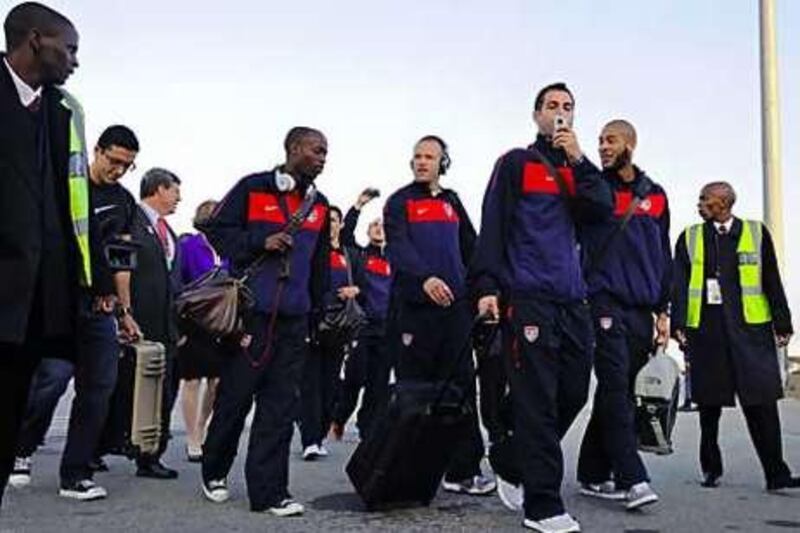The slogan on the side of the bus reads "Life, Liberty, and the Pursuit of Victory!" with the stars and stripes painted alongside. The USA World Cup team are making themselves at home in South Africa, ready at last to play the games that matter most. The Americans are staying in the 74-room Irene Country Lodge, a luxury hotel north of Johannesburg and south of Pretoria and protected by stone walls and barbed wire. There is a lake on the complex, with an adjacent farm filled with cows and enough roosters to make alarm clocks superfluous.
"It's been a long time," Carlos Bocanegra, the team captain, says. "Now it's finally here. We're in South Africa. So we're excited for the games to start. It feels real now that we're down here in South Africa and we're set up at our hotel and you see all the World Cup fanfare." The 23-man squad and about an equal number of coaches and support staff left Washington Dulles International Airport on Sunday evening and arrived 17 hours later to a warm welcome.
The team are now training for their tournament opener, against England on June 12. "The travel seemed quite easy. Maybe we're used to it by now," Bob Bradley, the US coach, says. Practice is not too far away in Pretoria's Pilditch Stadium, a lush green field surrounded by an eight-lane running track with about 5,000 seats on one side. Raised barriers topped with palm trees wrap the other segments of the field, and the leaves are starting to fade to brown as autumn approaches winter in the southern hemisphere. This will be the first World Cup south of the equator since 1978 in Argentina.
Following a few warm days last week in America's north-east, the US side has found themselves in a quite different climate: daytime highs of 15°C and lows at night near 5°. They will get to experience game conditions tomorrow, when they play Australia at Roodepoort, outside Johannesburg, in their last warm-up match. World Cup adverts are everywhere. Salesmen walk in the middle of streets between cars, hawking jerseys for the World Cup teams. Vuvuzelas - the metre-long horns that are blown in South African stadiums - are omnipresent in store windows.
After spending two World Cups in urban hotels in Seoul, South Korea, and Hamburg, Germany, the US team are in the countryside for the first World Cup in Africa. There are plenty of police with holstered guns and bulletproof vests, but the show of force thus far is less than at some previous World Cups. When the US team headed to training, motorcycles and police cars went in front of the bus, with more security vehicles trailing. US State Department officials also accompany the team.
"We have tremendous confidence in the security around our team," Bradley adds. The US were here at this time last year, too, when they also trained at Pilditch. The Americans upset Spain, the European champions, at the Confederations Cup, ending the Spaniards' record-equalling 35-game unbeaten streak, and then took a two-goal lead in their first ever Fifa final before losing 3-2 to Brazil. They headed to South Africa following a 4-2 loss last week to the Czech Republic and a come-from-behind 2-1 victory over Turkey. Based on those two games, there is much work to do before the first World Cup match between the US and England since the Americans caused a famous upset in 1950, when they won 1-0.
"We're trying to gel as a team and peak come June 12," Bocanegra says. "The thing that sticks out to me just at the moment is to be a bit better defensively and solid, have a better team shape from the back towards the front." This is the third trip to South Africa for many US players. In November 2007, the Americans beat South Africa in a friendly at Johannesburg's Ellis Park. Players know it will take time to adjust to altitudes of 1,200 to 1,800 metres in the area.
"I think we're familiar with the territory and how things work down here," adds Bocanegra. "We still need to get our feet on the ground here and get going." Following the group stage flop in Germany four years ago, players expect they will advance from a first-round group that also includes the relative minnows of Slovenia and Algeria. "We get to challenge ourselves against the best in the world," says Bocanegra. "That's what it's all about down here."
* AP





